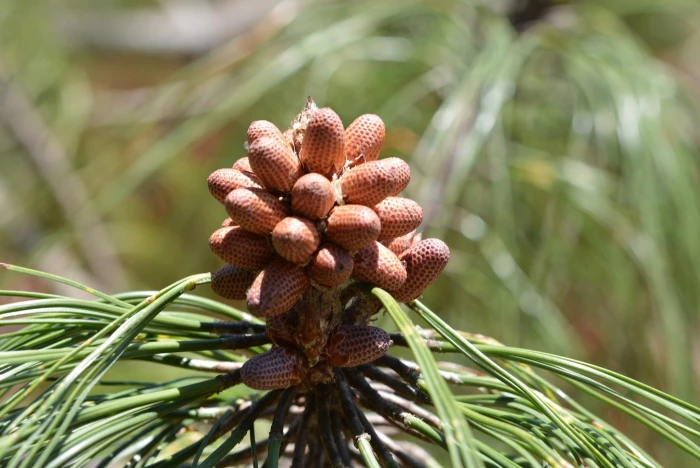Smooth-Bark Mexican Pine
/
(Pinus pseudostrobus)
Smooth-Bark Mexican Pine (Pinus pseudostrobus)
/

Neptalí Ramírez Marcial
CC BY 4.0
Image By:
Neptalí Ramírez Marcial
Recorded By:
Copyright:
CC BY 4.0
Copyright Notice:
Photo by: Neptalí Ramírez Marcial | License Type: CC BY 4.0 | License URL: http://creativecommons.org/licenses/by/4.0/ | Rights Holder: Neptalí Ramírez Marcial | Publisher: iNaturalist | Date Created: 2019-03-31T12:16:53-07:00 |

























Summary
Pinus pseudostrobus, commonly known as Smooth-bark Mexican Pine, is an evergreen tree native to montane cloud forests and pine-oak woodlands in Mexico and Central America, from Sinaloa to Nicaragua and Honduras. It thrives at altitudes between 2789-10663 feet (850-3250 meters). This species typically grows to a height of 26 to 82 feet (8-25 meters) with a dense, round crown and features distinctive brown, fissured bark. The needles are long, slender, and grouped in fascicles of five, with a soft, feathery appearance. Cones are large, elongated, and resinous, maturing to a light brown color.
Smooth-bark Mexican Pine is valued for its ornamental qualities, including its attractive bark and dense foliage. It is used in reforestation projects and as a timber tree in its native range. In cultivation, it requires well-drained soils and performs best in areas with a clear distinction between wet and dry seasons, mimicking its native habitat. It is adaptable to a range of soil types, from acidic to slightly alkaline, and prefers full sun conditions. While it is not commonly found in urban plantings, it can serve as a specimen tree in large gardens or parks. Gardeners should be aware that this species can be susceptible to pine wilt disease caused by the nematode Bursaphelenchus xylophilus, particularly when grown outside its native range.CC BY-SA 4.0
Smooth-bark Mexican Pine is valued for its ornamental qualities, including its attractive bark and dense foliage. It is used in reforestation projects and as a timber tree in its native range. In cultivation, it requires well-drained soils and performs best in areas with a clear distinction between wet and dry seasons, mimicking its native habitat. It is adaptable to a range of soil types, from acidic to slightly alkaline, and prefers full sun conditions. While it is not commonly found in urban plantings, it can serve as a specimen tree in large gardens or parks. Gardeners should be aware that this species can be susceptible to pine wilt disease caused by the nematode Bursaphelenchus xylophilus, particularly when grown outside its native range.CC BY-SA 4.0
Plant Description
- Plant Type: Tree
- Height: 50-100 feet
- Width: 20-40 feet
- Growth Rate: Moderate, Rapid
- Flower Color: N/A
- Flowering Season: Non-Flowering
- Leaf Retention: Evergreen
Growth Requirements
- Sun: Full Sun
- Drainage: Fast, Medium
Common Uses
Low Maintenance
Natural Habitat
Native to montane cloud forests and pine-oak woodlands
Other Names
Common Names: Pino Blanco, False White Pine, Smooth-Bark Mexican Pine, Falso-Pinheiro-De-Weymouth, Falso-Pinheiro-Strobus, Pinheiro-Da-Guatemala
Scientific Names: Pinus pseudostrobus, Pinus astecaensis, Pinus orizabae, Pinus pseudostrobus f. pseudostrobus, Pinus pseudostrobus var. estevesii, Pinus pseudostrobus var. oaxacana
GBIF Accepted Name: Pinus pseudostrobus
